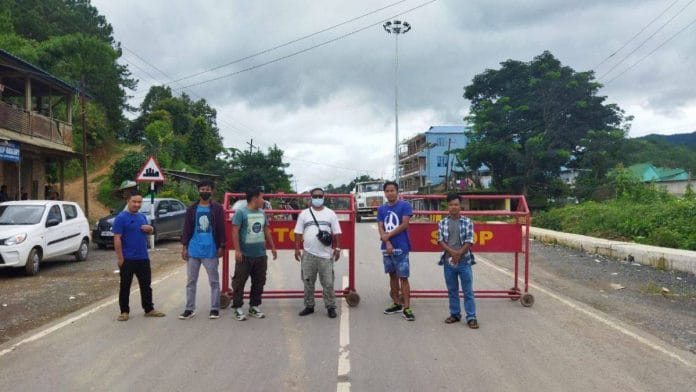Guwahati: The state of Manipur has been on the boil since the tabling of the contentious Manipur (hill areas) district councils 6th and 7th amendment bills in the state Assembly on 2 August.
The Manipur government Saturday had suspended internet services in the state for five days after protests broke out in several parts of the state against the bills.
Dozens of students and two policemen were reported to have been injured in Saturday’s protests. The All Tribal Students’ Union Manipur (ATSUM), which is leading the protests, met the state Tribal Affairs and Hills Minister Letpao Haokip, who tabled the Amendments in the Assembly, Sunday to discuss their demands.
“We can’t have a separate chief secretary for the hills and a separate one for the valley…. This is as good as having a state within a state,” Haokip had said to ThePrint about ATSUM’s demands before the meeting.
The tribal student’s group has been agitating over their demand for the tabling of the Autonomous District Councils (ADC) Amendment Bill 2021 in the state Assembly. The ADC Bill seeks greater financial and administrative autonomy in the hill areas and to ensure that they are able to develop on a par with the Imphal Valley region of the state.
However, earlier this week, instead of tabling the ADC Bill, the BJP-led government tabled the amendment bills in the state Assembly and the sixth amendment bill was passed Friday.
Speaking to ThePrint in an exclusive, Kakai Singsit, Finance Secretary of ATSUM, who was present at the meeting, said: “They told us that with the amendments, the bills aren’t so different from the ADC Amendment Bill 2021 and that there are just some controversial points that have been removed, but more or less it’s the same.”
The government, he said, has not given them any concrete assurances on this.
Singsit added that while “most of the problems have been resolved”, “there are a few contradictory points sticking out. We will sit with the government again soon. Before that the leaders will be meeting too,” he said.
Also read: Manipur has a ‘hill of poppies’ problem. But CM’s war on drugs must tackle land issues first
Economic blockade, communal tension
Saturday’s protests saw student protesters and police personnel clash in Imphal West district. According to an Indian Express report, the protesters had been demanding the release of five executive members of the ATSUM who were arrested Tuesday after the student body called for a 24-hour shutdown in the hill districts.
A high-ranking state police official told ThePrint, “The economic blockade [called by the ATSUM] on National Highway 2 and National Highway 37 is ongoing and goods trucks have not been allowed to move through.”
After the meeting, Singsit told ThePrint: “The state government requested us to leave the blockade and said that they will release the leaders. Our argument was that the crux of the issue is not that. It is the [amendment] bills. There was push and pull going on about that point.”
The Manipur government’s order to shutdown internet services for five days came in the wake of an incident that took place in the Bishnupur district, near Imphal, wherein a van was set ablaze by “Three-four youths suspected to be of a community”. “The crime has created a tense communal situation and volatile law and order situation in the state,” the order, which was accessed by ThePrint, states.
Singsit claimed that a Meitei group, the predominant ethnic group in the valley, had “locked” the ATSUM office in Imphal two days ago after “surrounding” it. “We strongly condemn this. Imphal is the capital of Manipur, it doesn’t belong to one community,” he said.
A.C. Thotso, general secretary of the All Naga Students’ Association Manipur (ANSAM), a tribal student body that has also been agitating against the amendments, claimed that the valley-based organisation, the Meitei Leepun, was “trying to communalise the issue”. “We are just demanding for our rights, not against any community,” he said to ThePrint.
Why the protests
The Manipur (Hill Areas) District Council Act, which was enacted in 1971, contains provisions for the creation of autonomous district councils in the tribal-populated hill districts of the state.
Residents of the hill areas, largely inhabited by tribal groups like Nagas and Kukis, have alleged for decades that their development has been neglected, especially compared to that of the predominantly Meitei-populated Imphal Valley. Last year, the Hill Area Committee, comprising 18 legislators from the hill districts, had proposed the ADC Amendment Bill 2021.
The new bills differ from some of the proposals of the ADC Amendment Bill, giving the state government more powers when it comes to appointments to district councils and the delimitation commission and the annual “income and expenditure” set by the ADC.
The student bodies have criticised the amendment bills as they believe the state government will, as a result, “monitor the power and the functioning of the Autonomous District Council”, ThePrint had noted in an earlier report.
“We had signed a Memorandum of Understanding with the state government that the ADC Amendment Bill 2021 will be brought up in the next state Assembly session…. The government is going back on its own commitment,” Singsit said.
“A total repeal of the principal act (of 1971) isn’t under the purview of the Hill Area Committee since it is on the Union List…. Also, the student bodies are demanding that you have to name the district council an autonomous district council, but you can’t do that unless you have been given Sixth Schedule status,” Haokip said.
(Edited by Zinnia Ray Chaudhuri)
Also read: ‘No public consultation’, razed forests: Manipur landslide raises questions on rail project






